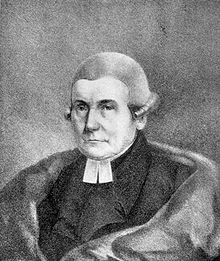Karl Ludwig Nitzsch
Karl Ludwig Nitzsch (born August 6, 1751 in Wittenberg , † December 5, 1831 in Wittenberg ) was a German theologian and an important representative of rationalist supranaturalism .
Life
Karl Ludwig Nitzsch was born as the son of the deacon of the Wittenberg town church Wilhelm Ludwig and Katharina Elisabeth Nitzsch (née Richter) in Wittenberg . He attended the high school in Wittenberg, then the princely school St. Afra in Meißen , in order to study theology at the Wittenberg University from 1770 to 1775 . He was supported in this by the Küchmeister and Lietzo family scholarships in Zerbst , to which his mother's family had rights. He began his career as a theologian as a pastor in Beucha near Grimma .
In 1785 he became pastor and superintendent in Borna and since 1788 monastery superintendent and consistorial assessor in Zeitz . In 1790 he acquired his theological doctorate and then became professor of theology at the University of Wittenberg, with the associated position of general superintendent of the Saxon spa districts, consistorial assessor and pastor at the city church in Wittenberg. As a result of the Napoleonic Wars of Liberation and the resolution of the Congress of Vienna on May 31, 1815, three fifths of the state of Saxony , including Wittenberg, fell to Prussia .
This led to the University of Wittenberg being relocated to Halle and the United Friedrich University of Halle-Wittenberg, which later became the Martin Luther University of Halle-Wittenberg , was founded there in 1817 . Thereupon Nitzsch lost his professorship at the university and the general superintendent was reduced to superintendent. As a replacement, Wittenberg got the evangelical seminary , which until 2012 had its seat in the rooms of the Augusteum . Nitzsch became the first director of the royal seminary in Wittenberg and remained so until his death.
From her marriage to Luise Elenore Gottliebe Wernsdorf (born September 9, 1757; May 12, 1826), the daughter of Johann Christian Wernsdorf I , three sons also gained importance: Christian Ludwig Nitzsch , Karl Immanuel Nitzsch and Gregor Wilhelm Nitzsch .
Selection of works
Inspired by Immanuel Kant , he endeavored, by distinguishing revelation from religion, ie the historical introduction of truth from religion itself, partly to free theology from belief in letters, partly to counteract the naturalistic tendencies of the time. His ideas about church constitution received widespread attention in his time. This is why extensive articles on this topic and other church questions have appeared. For those times, these are strictly scientifically carried out and also historically founded.
- About the salvation of the world . 1817
- About the salvation of the church . 1821
- About the salvation of theology . 1830
- Prolusiones de judicandis morum praeceptis in NTA Communi omnium hominum ae temporum usu alienis (Wittenberg university programs from 1791–1802)
- Single publications in:
- De revelatione religionis externa eaewque publica prolusiones academicae . Leipzig 1808
- De discrimine revelationes imperatoriae et Jidacticae prolusiones academicae . Wittenberg 2 volumes 1830
literature
- Wolfgang Böhmer : Famous Wittenberg guests. Rotary Club. Wittenberg, 2nd edition
- Otto Dibelius : The royal seminary 1817-1918 . Berlin
- Nikolaus Müller : The finds in the tower knobs of the town church in Wittenberg , Magdeburg 1912
- Walter Friedensburg : History of the University of Wittenberg . Publisher Max Niemeyer Halle (Saale) 1917
- August Hoppe: Monument to the immortalized Nitzsch. Hall 1832
- Friedrich August Berthold Nitzsch : Nitzsch, Karl Ludwig . In: Allgemeine Deutsche Biographie (ADB). Volume 23, Duncker & Humblot, Leipzig 1886, pp. 723-725.
- Veronika Albrecht-Birckner: Pastors' book of the church province of Saxony. Leipzig 2007, Vol. 6, 331
- Johann Carl Heinrich von Zobel: The life and work of the pastors and superintendents in the Königl. Saxon. City of Borna. Borna 1849
| personal data | |
|---|---|
| SURNAME | Nitzsch, Karl Ludwig |
| BRIEF DESCRIPTION | German theologian |
| DATE OF BIRTH | August 6, 1751 |
| PLACE OF BIRTH | Wittenberg |
| DATE OF DEATH | December 5, 1831 |
| Place of death | Wittenberg |
